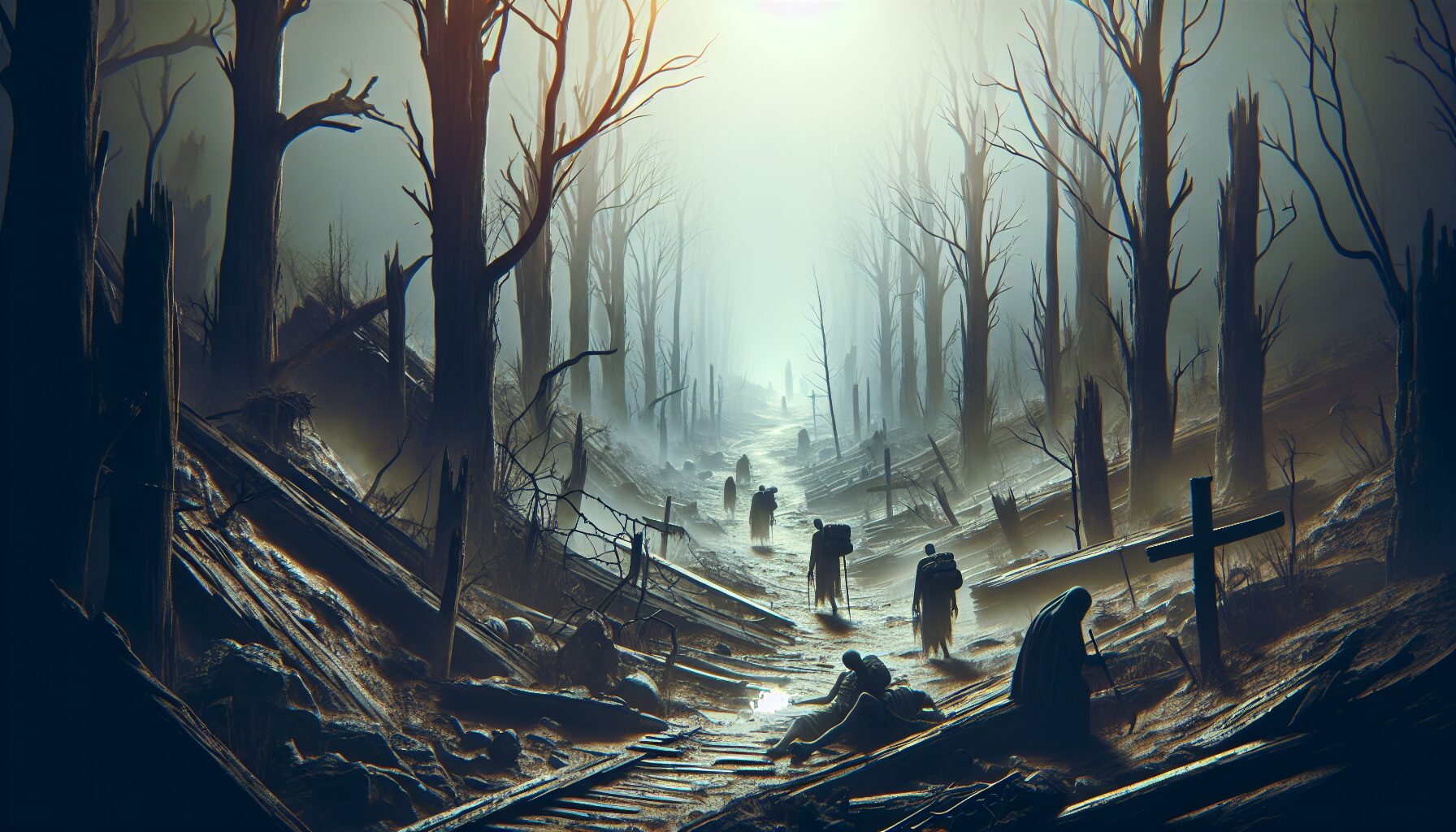In the pantheon of psychological and existential horror films, Necrotic Pilgrimage emerges as a chilling testament to the exploration of decay both physical and metaphysical. Directed by the visionary auteur Lucien Cross, this film is not merely a narrative about death, but an unsettling meditation on the profound transformations that accompany the end of life. Through stark imagery, ethereal soundscapes, and profound themes, Necrotic Pilgrimage is a haunting journey into the labyrinthine corridors of decay.
Plot Synopsis
The film follows the enigmatic journey of Marcus, a tormented artist constrained by his fear of mortality. As his health deteriorates, he embarks on an obsessive quest to document decomposition in its rawest form. This journey takes him from the abandoned cemeteries of Eastern Europe to the desolate, decaying landscapes of forgotten towns. What begins as an effort to immortalize death through art descends into a compulsive odyssey that unravels Marcus’s psyche.
“Lucien Cross crafts a visceral universe where the visual decadence of decay becomes a metaphor for the decay of the human spirit.” – Fictional Movie Reviews
Exploration of Themes
Existential Dread: At its core, Necrotic Pilgrimage is a meditation on existential dread. The film unflinchingly delves into humanity’s inescapable anxiety towards death. Marcus’s journey is not just a physical expedition; it is an exploration of his own mortality and the dread it invokes.
Decay as Transformation: Lucien Cross is meticulous in his portrayal of decay, not just as an end, but as a transformation. The film juxtaposes images of decomposition with scenes of rebirth and renewal, highlighting the cyclical nature of life and death. As Marcus witnesses the beauty and horror of decay, he begins to confront the deepest fears that lurk within.
The Artist’s Torment: Marcus embodies the struggle of the artist against the ennui of existence. His quest to capture the ephemeral nature of life becomes a personal torture that echoes the experiences of many artists who seek to immortalize fleeting moments in time.
Sensory Experience
Visually, Necrotic Pilgrimage is a masterpiece. Cinematographer Elise Varga crafts each frame with an eye for the surreal and the sublime. The cinematography oscillates between hauntingly dark and unexpectedly beautiful moments, portraying decay in all its facets. The film’s color palette is subdued, with earthy tones dominating most scenes, effectively immersing the audience in the film’s melancholic atmosphere.
The sound design is equally impactful. Composer Aria Lin infuses the film with an atmospheric score that blends ethereal strings with ambient noises. The soundtrack enhances the visual storytelling by creating a pervasive sense of unease, accentuating Marcus’s descent into madness.
“The soundscape in Necrotic Pilgrimage is as haunting as the visuals are mesmerizing, weaving a melodic narrative that echoes Marcus’s inner turmoil.” – Cinematic Music Score
Performance Highlights
Actor Jonathan Reeve delivers a compelling performance as Marcus. His portrayal is rife with subtlety, capturing the nuances of a man locked in an existential battle with himself. Reeve’s ability to convey dread, obsession, and eventual acceptance of decay carries the film’s weight.
The supporting cast is equally riveting, with Ava Chen playing Serena, Marcus’s confidante. Chen’s performance balances Reeve’s intensity, providing a sense of grounding warmth amidst the pervasive gloom.
“Jonathan Reeve’s portrayal of Marcus is a masterclass in depicting internal conflict, making Necrotic Pilgrimage a poignant exploration of fear and transformation.” – Actor Insights
Cultural Impact
Since its release, Necrotic Pilgrimage has sparked numerous discussions about its themes and narrative structure. In an era where horror often gravitates towards the supernatural, this film is a refreshing exploration of horror through a philosophical lens.
The film’s engagement with decay mirrors contemporary societal anxieties regarding life, death, and the human condition. Lucien Cross’s distinctive voice as a filmmaker encourages audiences to confront their discomfort with decay and mortality.
The film has also influenced a new wave of horror directors who are turning to more introspective narratives. By prioritizing thematic depth over shock value, Necrotic Pilgrimage sets a precedent for future horror films that wish to explore existential themes.
Conclusion
Necrotic Pilgrimage is more than a film about death and decay; it is an odyssey through the darkest vestiges of the human condition. Lucien Cross’s methodical storytelling, coupled with evocative imagery and a haunting score, invites viewers to embark on a journey that is as enlightening as it is unsettling.
By challenging audiences to find beauty amidst decay, Necrotic Pilgrimage transcends the traditional boundaries of horror cinema, offering an introspective look into the complexities of human existence and the inevitability of decay.
“Lucien Cross reinvents horror, not by simplifying life and death, but by embracing their intricate complexity with artistic grace and philosophical depth.” – Thoughtful Horror Review
In the ever-evolving landscape of cinematic horror, Necrotic Pilgrimage stands as a bold statement on the transformative power of decay, echoing that within the shadow of death, there lies a journey of profound revelation.
